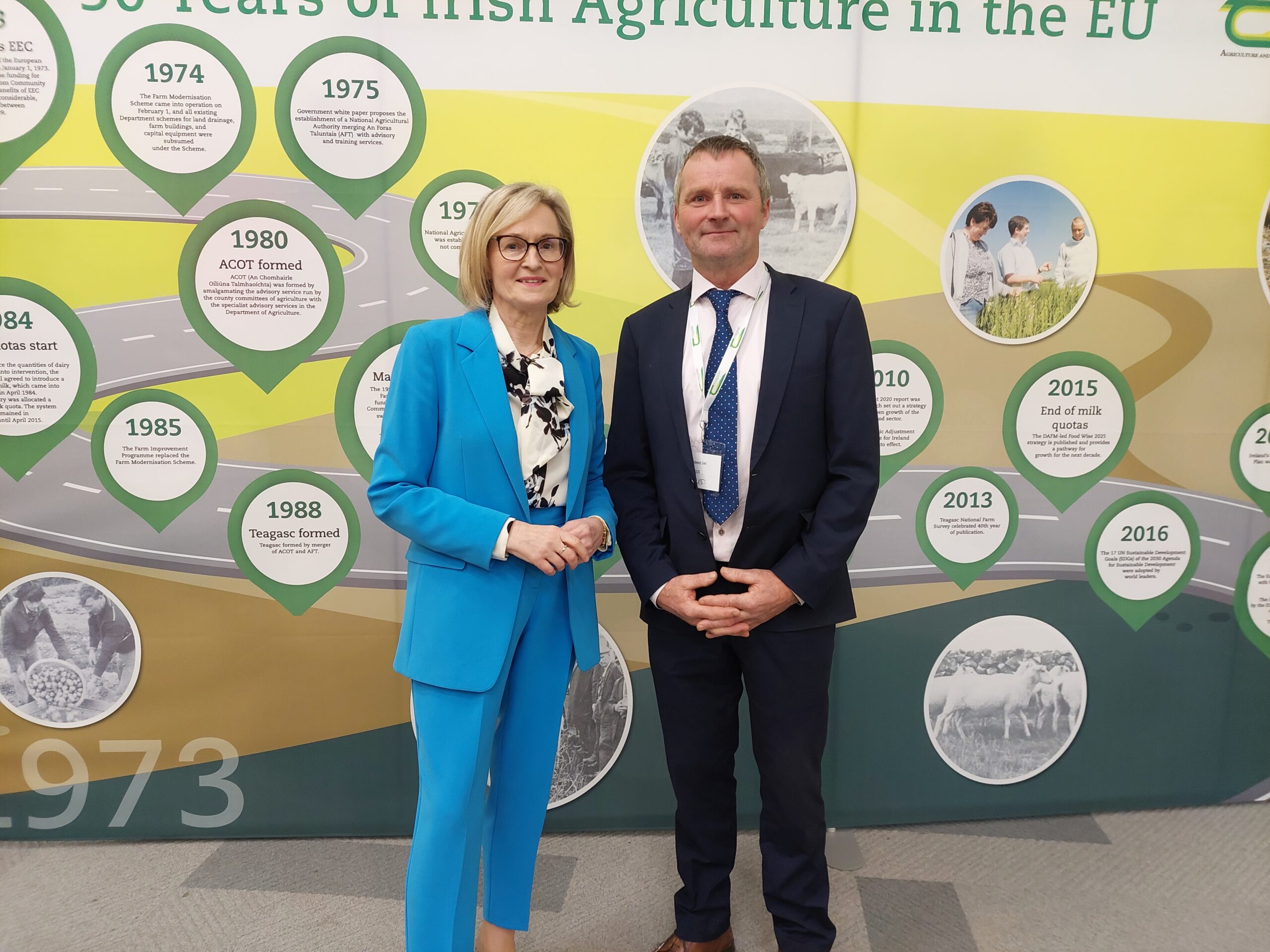Teagasc look back at Irelands 50 years in the EU
 Commissioner Mairead McGuinness and Edward Carr at Teagasc 50th
Commissioner Mairead McGuinness and Edward Carr at Teagasc 50th
ICOS President Edward Carr and EU Affairs manager Damien O’Reilly were among the invited guests to attend a conference to mark 50 years of Ireland’s membership of the European Union and its impact on agriculture at the Teagasc Research Centre Ashtown, County Dublin at the end of October.
Speaking at the event, Mairead McGuinness, European Commissioner for Financial Stability, Financial Services and Capital Markets said; “Ireland has come a long way over the past 50 years and experienced many changes and challenges – not least in the agriculture sector. Joining the EEC in 1973 saw Ireland move from the periphery to the heart of Europe, with greater access to markets for beef, dairy and sheep. There have been swings in the fortunes of Irish agriculture through those 50 years, price and income shocks, beef and butter mountains and weather related challenges. The coming years will see an intense focus on sustainability. Farmers as custodians of the land are vital in achieving our climate and environment goals. They need all the research and advisory services to assist them in this transition. Farmers have adopted technologies and new ways of working over the last 50 years and they can do that again in the years ahead.”
The conference was also addressed by Charlie McConalogue TD, Minister for Agriculture, Food and the Marine and by Marc Fesneau, the French Minister for Agriculture.
Speaking at the event, Minister McConalogue said; I would also like to extend a very special welcome to my colleague, Marc Fesneau, the French Minister for Agriculture. Ireland’s accession into the European Economic Community, now the European Union, in 1973 was a pivotal moment in our Nation’s history. Few events have been as transformative. The decision to join the European Community was overwhelmingly supported by the people of Ireland, and was driven by their desire for peace, unity, and shared prosperity. Those convinced Ireland’s future lay in Europe showed courage, courage in a new vision for our country, as members of a bigger European family.”
Speaking at the Teagasc EU 50 event, Minister Fesneau said; “Within the European Union, Ireland and France are trusted partners, particularly when it comes to agriculture. The Common Agricultural Policy, which came into force in 1962, is one of the oldest European policies and one of the major foundations of European construction. Within the EU, Ireland and France share a common vision of agriculture: sustainable, resilient and successful, based on a family model.”
The conference heard how the Irish agriculture sector has modernised, mechanised and specialised. Irish farming continues to be dominated by dairy and beef production. There has been a move away from mixed farming systems over the 50 years to more specialised farms. There has also been a decline in the number of farmers and in the numbers working in farming with the latest figures indicating 135,000 farms and accounting for about 4% of Ireland’s labour force. That is 90,000 fewer farms than there were in 1975. Average family farm income per farm has increased between 1973 and 2022. But in real terms, incomes are largely similar. Dairy and tillage farmer’s incomes are higher than sheep and cattle farms and there has been increased divergence.
The area under tillage has declined by 100,000 hectares, but crops yields have increased. Pig production has increased but there are way fewer pig farmers today compared to 50 years ago. Since milk quotas were lifted in 2015, there has been a growth in milk production in Ireland but not across the EU.
When Ireland joined the then EEC in 1973, ICOS opened an office in Brussels which was run by Greg Tierney. This year ICOS along with the IFA celebrated the 50th anniversary of the opening of both their offices with a reception held in Brussels in April.